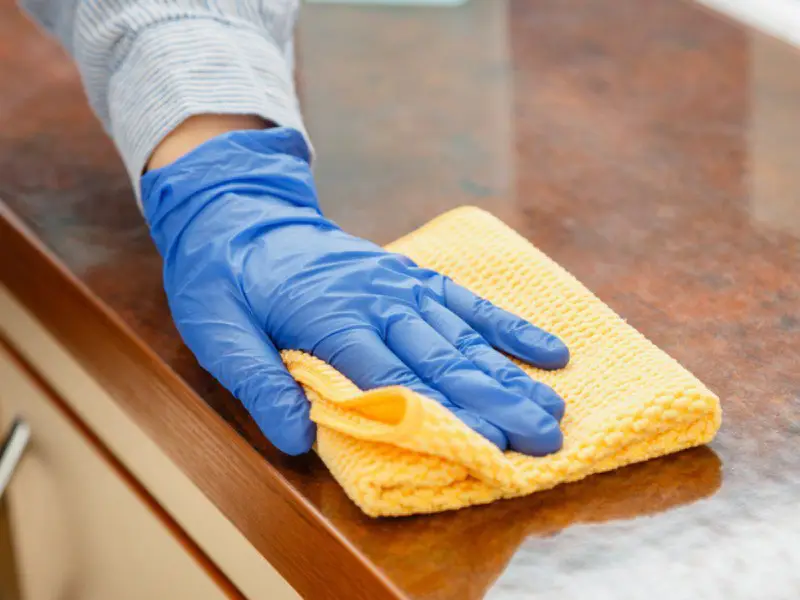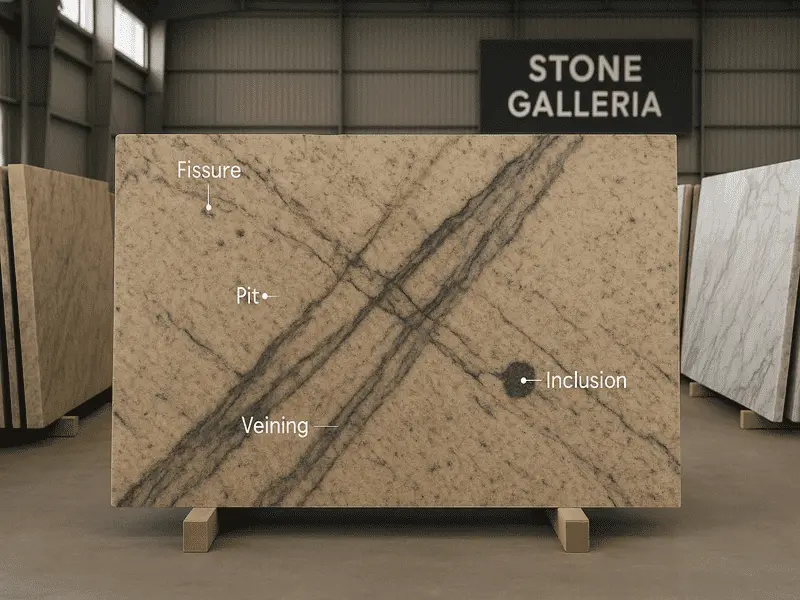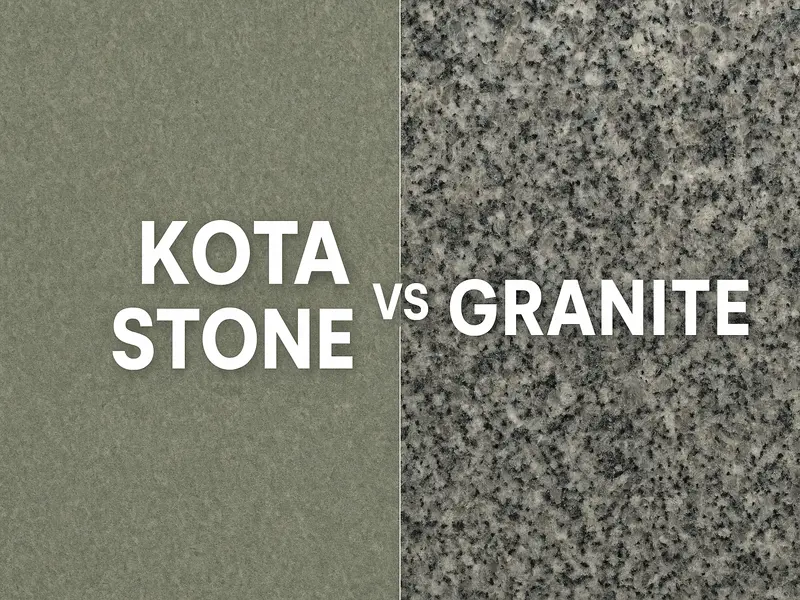Before buying natural stone espcially granite, a range of questions often comes to mind — does granite scratch, granite’s stain resistance, porosity, hardness, and more. Natural stones like granite can leave you wondering about their true durability, especially since they don’t come with the comprehensive manuals that engineered materials do. With so much information available these days, it can be challenging to know which details to trust.
Granite is renowned for its strength and stunning appearance, making it a popular choice for countertops, floors, and other surfaces. Yet, despite its reputation for resilience, you might still ask—“Does granite scratch?” or “Will granite scratch?”
In this blog, we’ll address these concerns and provide a clear understanding of granite’s scratch resistance. We’ll explore how well granite stands up to everyday use and whether it’s as durable as it’s often claimed to be. By the end, you’ll have the knowledge you need to decide if granite is the right choice for your next project. Let’s dive into the real story behind granite’s durability and discover if it meets your needs.
.webp)
What Is Granite? Why Understanding Granite Scratch Resistance Matters
Before diving into the specifics of granite scratch resistance, it’s essential to understand what granite actually is and its origins. This foundational knowledge will help explain why granite is so durable and scratch-resistant.

Granite is a natural stone formed from the cooling and solidification of magma or lava. It’s composed mainly of quartz, feldspar, and mica, giving it a grainy appearance and a wide range of colors. Granite is an igneous rock, which means it’s formed from molten rock that has cooled and solidified over thousand to millioin of years. This process makes granite extremely hard and durable, which is why it’s often used in construction.
Also READ | Explore Array of Granite Colours, Beyond Basic Black & White
.webp)
How Granite’s Hardness Affects Scratch Resistance
When evaluating granite scratch resistance, it’s essential to consider the hardness of granite itself.
The hardness of a material is typically measured on the Mohs scale, which ranges from 1 (softest) to 10 (hardest). Granite typically ranks between 6 and 7 on this scale, which means it’s quite hard. For comparision context, diamond, the hardest known natural material, scores a 10 on the Mohs scale.
Granite’s high position on this scale means it is much harder than common materials such as glass and steel, which makes it less likely to be scratched by everyday objects.
Granite’s hardness contributes to its scratch resistance. Materials with a lower Mohs rating, such as limestone or marble, are more prone to scratching.
Also READ | What Is The Hardness Of Granite? Understanding Granite Hardness on the Mohs Scale
Can Granite Be Scratched?
The high hardness level means that granite can withstand the everyday wear and tear typically associated with kitchen countertops, bathroom vanities, and flooring.
The Nature of Scratches
To understand if granite can scratch, it’s essential to differentiate between different types of scratches:
Surface Scratches: These are minor scratches that occur on the surface of the granite. They are usually caused by abrasive materials such as sand, grit, or small particles that may come into contact with the granite surface. Surface scratches are often superficial and can sometimes be buffed out or repaired.
Deep Scratches: These are more severe scratches that penetrate deeper into the granite. They are typically caused by sharp objects like knives or heavy impacts. Deep scratches may require professional repair or refinishing.
ALSO Read | Does Granite Stain? Understanding the Risks, Prevention & Solution
What Can Scratch Granite?
As we have discussed so far, granite is resistant to scratches, but it is not entirely scratch-proof. Here are some things that can scratch granite:
Diamond and Other Hard Minerals: Diamonds are much harder than granite and can easily scratch its surface.
Metal Utensils: While regular use of metal utensils may not easily scratch granite, repeated and forceful use, particularly with sharp objects like knives, can cause scratches.
Grit and Sand: Small, gritty particles like sand can act as abrasives. If they get trapped between an object and the granite surface, they can scratch it.
Ceramic and Porcelain Items: Items like ceramic dishes, pots, and pans can scratch granite if they are dragged across the surface.
Heavy and Rough Objects: Dragging heavy or rough objects across the granite surface can cause scratches, especially if these objects have rough or sharp edges.
To maintain the pristine condition of granite, it is recommended to use cutting boards, avoid dragging heavy items across the surface, and keep the surface clean and free of abrasive particles.
.webp)
Will Granite Scratch Under Everyday Use?
In general, granite is quite resilient and can handle most daily activities without showing noticeable scratches. You can place hot pots, pans, and kitchen utensils directly on granite surfaces without worrying about immediate damage. The surface can also endure heavy foot traffic when used for flooring.
However, it’s important to note that while granite is resistant to scratches, it is not entirely scratch-proof. Sharp or abrasive materials, such as metal utensils or gritty substances, can potentially leave marks on the surface. To minimize the risk of scratches, it’s advisable to use cutting boards for food preparation and avoid dragging heavy objects across the granite.
Overall, granite’s durability under everyday use is one of its many advantages, but proper care and maintenance will help keep it looking its best for years to come.
Buying Guide: What to Look for in Scratch-Resistant Granite
When purchasing granite for your home or business, consider the following factors to ensure you choose a scratch-resistant option:
Granite Hardness: Look for granite types known for their hardness, such as black granite or granite with a high quartz content.
Finish: Opt for a polished finish if scratch resistance is a priority.
Sealing: Ensure the granite is properly sealed to protect against scratches and other forms of damage. Ask the supplier about the type of sealant used and how often it needs to be reapplied.
Thickness: Thicker granite slabs are generally more durable and resistant to damage, including scratches.
Supplier Reputation: Purchase granite from reputable suppliers who provide high-quality materials and offer warranties or guarantees.
Which Granite Finish is Best for Scratch Resistance?
When considering scratch resistance for granite surfaces, the type of finish can play a significant role. Here are the most common finishes and their scratch resistance properties:
- Polished Finish:
- Characteristics: Shiny, reflective, and smooth.
- Scratch Resistance: Polished granite is less prone to scratching compared to other finishes because the surface is more refined and compact. However, any scratches that do occur may be more visible due to the reflective nature of the finish.
- Honed Finish:
- Characteristics: Matte or satin finish, smooth but not reflective.
- Scratch Resistance: Honed granite is slightly more susceptible to scratches compared to polished granite because it has a more open surface. However, scratches are less noticeable on a honed finish due to the lack of reflection.
- Leathered Finish:
- Characteristics: Textured, with a soft sheen and a slightly rough surface.
- Scratch Resistance: Leathered granite is quite durable and hides scratches well due to its textured surface. This finish provides a good balance between aesthetics and scratch resistance.
- Flamed Finish:
- Characteristics: Rough, textured, and non-reflective.
- Scratch Resistance: Flamed granite is very durable and resistant to scratches, with the rough texture hiding any minor scratches effectively. It is often used in outdoor and high-traffic areas.
Recommendation
Polished Finish: If you prioritize scratch resistance and want a sleek, shiny look, a polished finish is ideal. It’s the most resistant to scratching among the common finishes.
Leathered Finish: If you prefer a more textured look that hides scratches well, a leathered finish is a great option. It offers good durability and a unique appearance.
Conclusion
In summary, granite is a highly durable and resilient natural stone, well-regarded for its ability to withstand everyday wear and tear. Its impressive hardness, measured between 6 and 7 on the Mohs scale, plays a significant role in its resistance to scratches. This hardness means granite can endure the rigors of daily life, from kitchen use to heavy foot traffic, without showing noticeable damage.
While granite’s scratch resistance is robust, it’s not entirely impervious to scratches. Sharp or abrasive objects can still potentially leave marks on the surface. Therefore, taking a few preventive measures—such as using cutting boards and avoiding the dragging of heavy items—can help maintain its pristine condition.
By understanding granite’s composition and its scratch resistance, you can make a well-informed decision about whether this material is the right choice for your project. With its combination of beauty, durability, and ease of maintenance, granite remains a popular option for a variety of applications. Armed with this knowledge, you can confidently select granite, knowing it offers both aesthetic appeal and practical performance.
Stone Galleria
If your granite surfaces need a refresh or you’re planning a new project, Stone Galleria has you covered. We offer high-quality granite from Rajasthan, including beautiful options from Kishangarh and Jalore.
Contact us today to explore our selection and get the perfect granite for your home or building. Email us now to get started!


 Fact Checked
Fact Checked














